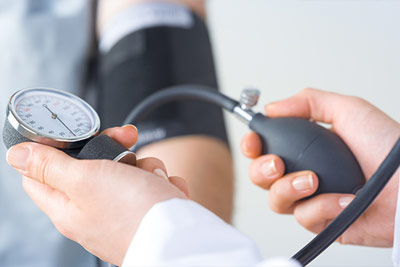
Blood pressure is a measure of the force of a person’s blood against the walls of their arteries as it flows through their body. Everyone has a blood pressure. But when your blood pressure is too high it can be a problem. High blood pressure is also called hypertension.
The Centers for Disease Control and Prevention (CDC) estimates that 1 in 3 American adults has high blood pressure. Research shows a clear relationship between high systolic (top number)blood pressure and high diastolic (bottom number) blood pressure with cardiovascular disease. High blood pressure has been shown to be associated with:
- Heart disease
- Stroke
- Vascular diseases
- Heart attack
- Heart failure
- Angina
- Peripheral artery disease
- Abdominal aortic aneurysm
While genetics can play a part in hypertension development, so can lifestyle. A diet high in salt or sodium, a diet low in potassium, being overweight or obese, lack of exercise, unmanaged stress, and smoking can contribute to high blood pressure.
As diet, obesity status, and exercise can contribute to high blood pressure, Dr. Shillingford sees a lot of gastric sleeve, gastric bypass, and lap band patients who suffer from hypertension. Many don’t know they have it. How could that be? High blood pressure often has no symptoms, which is why it’s known as the ‘silent killer.’ Symptoms thought to be from high blood pressure include:
- Headaches
- Difficulty sleeping
- Nosebleeds
- Sweating
- Facial flushing
- Dizziness
- Blood spots in the eyes
- Nervousness
But, these symptoms may not actually be due to high blood pressure, and can often be attributed to other ailments. That means that people can not rely on symptoms to alert them if they do in fact have hypertension. The best way to know if you have hypertension is to regularly check your blood pressure. This can be done with a machine at home, at your doctor’s office, and oftentimes at your local pharmacy.
Bariatric patients often see a reduction in their blood pressure with their weight loss, dietary changes, and incorporation of exercise into their lifestyle. Many of Dr. Shillingford’s weight loss surgery patients are able to reduce their antihypertensive medications and some are able to discontinue the medications completely. If you are overweight or obese and have high blood pressure, take advantage of Dr. Shillingford’s free informational session to learn if gastric sleeve, gastric bypass, or lap band surgery is right for you. Call Dr. Shillingford’s Boca Raton office today at (561) 483-8840. Dr. Shillingford, MD, Pa is a board-certified surgeon who specializes in advanced laparoscopic and robotic surgery, including gastric sleeve, gastric bypass, and lap band surgeries.



